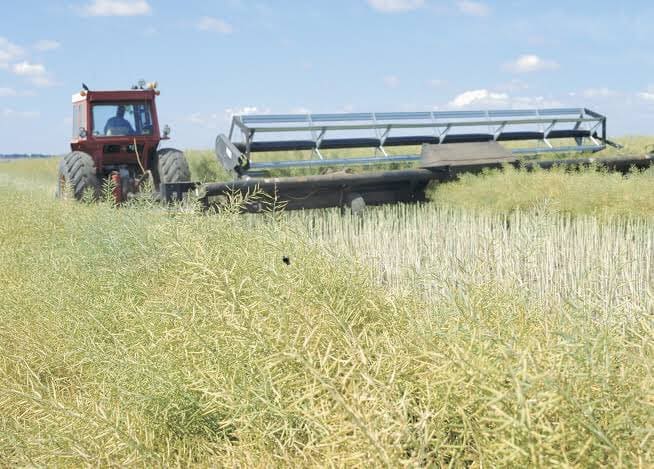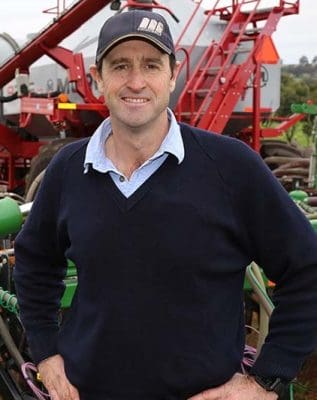
Windrowing canola, which can only be desiccated with certain chemicals if it is to meet ISCC criteria. Photo: Australian Oilseeds Federation
WITH a new array of International Sustainability and Carbon Certification (ISCC) requirements set to come into effect in December, Western Australian Farmers Federation (WAFarmers) Grains Council is questioning whether a new Australian-driven scheme would better serve the needs of local growers and traders.
The ISCC is a voluntary program that provides assurances to export markets that the grain is produced in a sustainable and ethical way.
Originally introduced for canola imported into the European Union for the biofuel industry, ISCC accreditation is now also applied to some Australian barley, oats and wheat exports to additional markets also.
In Australia, WA’s CBH Group and Sustainable Grains Australia (SGA), overseen by the Australian Oilseeds Federation (AOF), administer the scheme with some overlap.
They assist growers who join the program, including providing guidelines and templates, as well as supporting participants with the audit process.
Last season SGA had almost 5000 growers, mostly in eastern states, signed up to the program.
Numbers aren’t available on growers signed up through CBH, but according to the company it sold 1.2 million tonnes of sustainably certified grain in 2020-21 (Jul-Jun).
CBH has estimated that since 2010, ISCC canola has delivered more than $543 million in value to WA growers, providing an average premium of an additional $44.71/t for non-GM canola.
Growers who join the program initially complete a self-assessment of their practices, such as land biodiversity, fertiliser application, soil fertility and safe working conditions.
Participants may be randomly selected to undertake an audit, which is conducted by an independent organisation.
ISCC expands requirements
ISCC has recently expanded requirements of growers to complete four operation plans including an environment impact report, soil management plan, waste management plan and greenhouse gas emission reduction plan; have a defined ecological focus area of at least five per cent of the farm’s area; cease burning of arable stubble; and limit employee’s weekly working hours to 48 hours.
WAFarmers Grain Council president and mixed farmer Mark Fowler said he was concerned about the new ISCC principles and the extra burden that they may put on growers.

WAFarmers grains president Mark Fowler. Photo: GRDC
Mr Fowler said some of these requirements “will not be easily met by growers”.
He said growers don’t have the time to dedicate to completing the documentation, even with the assistance from CBH and SGA.
“Those extra plans will have an administrative requirement and there is a significant amount of time that will have to be invested into doing that,” Mr Fowler said.
“Farmers just do not have the time for that kind of stuff.”
Mr Fowler called the workplace principles “repugnant” and said growers were already required by law to follow strict employment regulations.
“We have one of the most sophisticated workplace regulation systems in the world.
“There are reams and reams of statutory law and regulation in this space and to try and cut across that with one paragraph is silly.”
He said he also fears that the ISCC requirements may become more stringent, and growers will have no choice but to comply if they want to be considered sustainable.
AOF executive officer Nick Goddard said the new principles will only provide further validation of the existing sustainable behaviours of Australian growers.
“It is basic good practice for farmers to operate under…but now it gives farmers a chance to document that,” Mr Goddard said.
He said SGA and CBH provide support to growers and checklists to reduce the administrative burdens of the requirements.
Mr Goddard said, as long as growers follow Australian employment laws, they have nothing to fear by the new ISCC working hour restrictions.
“Within the realms of practicalities, that requirement can be met as well.
Certification here to stay
Mr Goddard said ISCC requirements offer a ready-made system to demonstrate the sustainable practices Australian growers are already undertaking.
“The Australian grains industry is already acting in a very sustainable way, and we only need an external validation of that.
“It is one thing to say, ‘we farm sustainably’, but it is much more powerful when you can get an external body to validate that.”
He said there is a growing number of countries and international companies demanding some form of sustainability certification and this doesn’t look set to change.
“Increasingly customers are wanting some sort of external validation of the sustainable nature of their grain.”
Mr Fowler said, due to this level of growth, it is conceivable that traders, like CBH, will decide to only buy ISCC-certified grain.
“Because trade has a certain demand for sustainable grain that is certified…they now want to attach that label to almost every grain purchase that they make.
“You almost can’t sell grain in Western Australian unless it is ISCC certified.
“I know that CBH want all their grain to be certified as sustainable because, even if it is not required for market access, it is a market edge that they want.”
Mr Fowler said practicing sustainably is not an issue for most growers, but the administrative process of proving it via administrative processes and highly specific European-centric principles is what creates roadblocks for the industry.
Can Australia create its own?
Mr Fowler argues that the Australian grains industry is well placed to develop its own version of the ISCC system which would better serve local growers.
“I think everyone agrees that we need to not just be sustainable, but we have to prove it.
“We should do this in accordance with our own sustainability requirements because…we can produce one that is more tailored and better suited to the Australian landscape and people and climate.”
He said, because of the already strong level of sustainable practice adoption, any Australian system could be more robust than the ISCC program and, therefore, make the grain more attractive to export markets.
“It actually would not have any meaningful change to what we are doing at all, except you’d have to build brand recognition.
“This would mean going out to the international market and explaining what we have done and marketing it.
“I think that is entirely proper for a $20 billion industry.”
WAFarmers Grain Council parent organisation Grain Producers Australia last year came out in support of an Australian designed and managed system.
Mr Goddard said he agrees that it would be possible to have an Australian system, but it would not be an easy process to have it accepted internationally.
“The reason we have gone with ISCC is that it is an off-the-shelf package that is accepted globally, by not just the EU regulations, but by all the major food companies and others.
“There is nothing to say that we can’t [have an Australian system], and we would have to go through some hoops to get that validated throughout the supply chain, but, nonetheless, it is no doubt doable.”
CBH Group said it is agnostic in its view of which system is used, as long as the framework provides new and higher-value markets for its growers.
“The range and volume of ISCC grain certified and exported has grown rapidly, reflecting the changing needs and expectations of customers,” a CBH Group spokesperson said.
“We are committed to maintaining existing and securing new markets for WA growers.”
CBH Group said it acts as an intermediary between ISCC and growers to ensure participants understand the requirements, compliance obligations and processes.
“CBH continues to engage with ISCC and the program’s Australian-based auditors and local WA growers on the application of the new requirements, the timeline and conduct of future audits, and participation in the program.”
Who would run it?
Mr Fowler said the relativity new Grains Australia body would be the ideal organisation to administer a new Australian sustainability standard.
He acknowledged that the group would need time to finalise its basic operations before considering this major move.
Mr Goddard said any organization that governed the framework would need to be “prepared to engage with certificate holders” and the wider industry.
“It would need good collaboration with the rest of the supply chain to make this work.”

If ISCC needs tweaking to meet Australian conditions then so be it, but “reinventing the wheel” will just waste money.